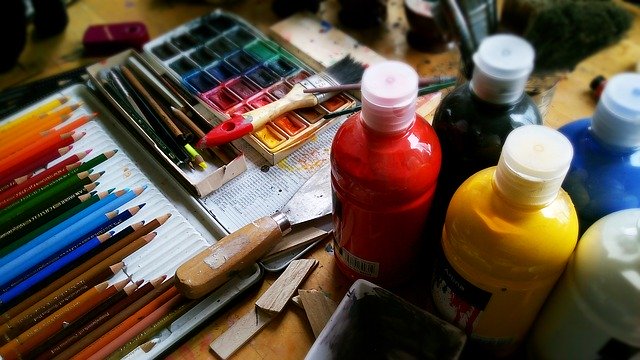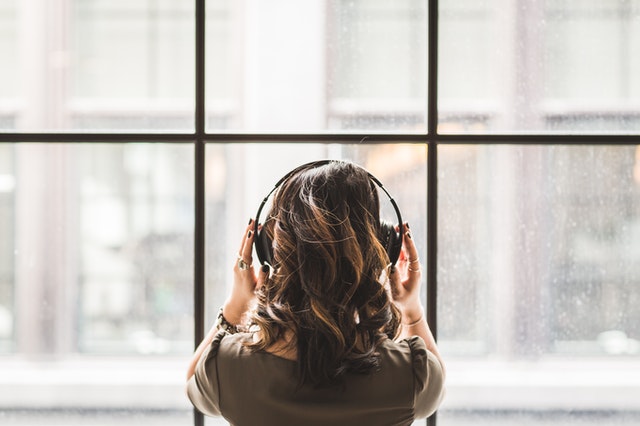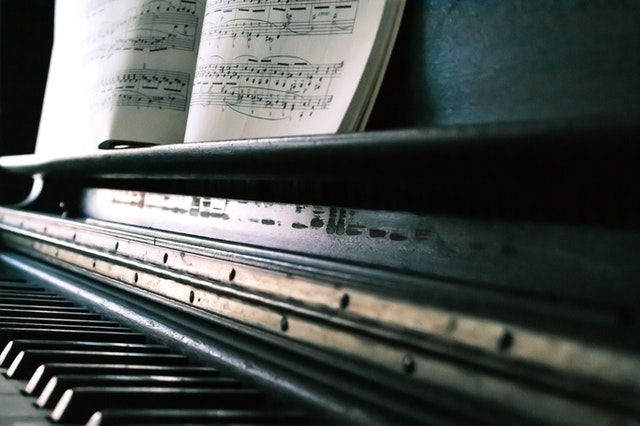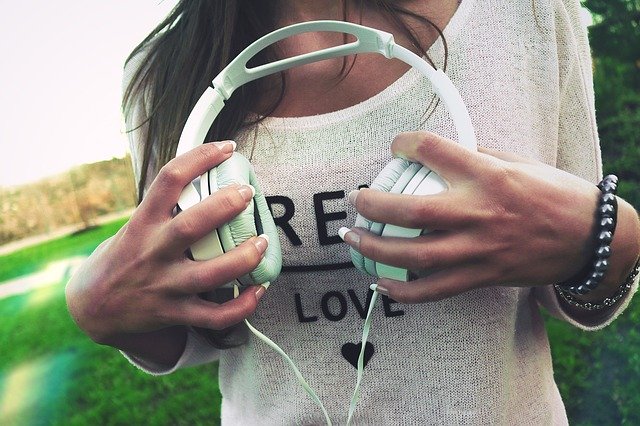
Music therapy for happy thoughts?
How music therapy can change your life
It’s interesting to consider that before recording technology was invented, certain music was a single event that you had to attend in person to enjoy. Chances are that you then had to remember it for the rest of your life because you’d never have the chance to hear that performance again. Because true talent was so rare to witness, the music was truly respected and expensive to enjoy. It was an event that could change your entire mood and outlook on life.
When I was little and still living in Germany, everyone was obsessed with David Hasselhoff. I must have watched every episode of Knight Rider and Baywatch. All the kids in the neighborhood were super impressed by the talking car as well. These were some of the very first American TV shows we watched.
As a surprise, my parents bought us tickets to the David Hasselhoff concert in Munich. I could not sleep for weeks before, I was so excited to go. On the day of the concert it was raining, but nothing could stop us from being happy. Even now, decades after that concert, I still remember the feeling of that one extraordinary day.
Although I was very young at the time, I think I realized the amazing power of music that day. And also what a huge crowd all tuned into the same music feels like. My taste in music has since changed a lot, but that uplifting and incredible day is something I will likely never forget. My own personal experience with music only deepened after that concert.

The sounds of music therapy
Music has had quite a journey since its early beginnings. From a bone flute thousands of years ago, to the first recordings on stationary gramophones. And from A-Tracks and cassettes that let you listen in the car to a whole room of CDs available on one device in your pocket.
Today, music today is so accessible that you see people listening while going for a jog. Or pulling up a quick lullaby on their phone to put their little one to sleep for a long car ride. Music is everywhere, on the radio, the TV, in movies, and online. Every genre is digitally available to us any time we want to listen to it.

Millions of people go to concerts and live music because that is truly one of the best ways to experience music. But even more people listen to music on demand, wherever they are. The digitization of music has made it available to so many people, who are unable to go to concerts or experience it live.
The types and styles of music available nowadays is simply astonishing.
“Music gives a soul to the universe, wings to the mind, flight to the imagination and life to everything.”
- Plato
Historically, we see a lot of classical and religious music. When you compare that to the wide variety of music produced today, you can start to understand how people use music as a medium to express themselves and their unique style. While our choices of music are ever growing, we may need some help re-discovering the truly life-impacting effect music can have on our mood, mental health, and overall life.

Therapeutic music activities
Drumming
For my 25th birthday, my parents gave me a drum. I had fallen in love with drumming on a recent trip to the UK and found that drumming circles helped a lot with my depression. At home, I continued that experience with my own drum and still find that the absolute relaxed state that drumming puts me into is very effective in battling depression.
I am guessing that different people will be attracted to different instruments and maybe you can achieve that same state of relaxation playing the piano, the guitar, or another instrument. The important thing is that playing music engages the opposite side of the brain that is involved in anxiety.
This shifts your focus and attention away from depression and anxiety, allowing you to enter a more relaxed state.
Art expression and music therapy
Another way that music works for me is by drawing what I see and feel while listening to music. As opposed to just listening to music, this is a hands-on activity. I put on a piece of music or playlist of my choice, depending on what mood I am in, and while it is playing I simply color and draw on a piece of paper.

This flow of creativity and expression helped me take a small break from the state of anxiety and depression I was in. I felt that my depression was alleviated for short periods of time during this activity, which is why I still enjoy doing that today. You can also color in mandalas or adult coloring books, if you prefer.
Meditation
Meditation can also be used as a type of music therapy. I usually create my own guided meditations and add a music background of my choice, but you can record your own meditations or simply use someone else’s. Meditation music puts me in a deep state of relaxation. It is another very effective music tool I still use every day, to heal my body and center my mind.
You can even combine color and music therapy. There are charts that assign frequency and wavelengths to each color and you can tune your music to work with a specific color. This works very well if you are doing a Chakra meditation, for example, and want to work with a specific Chakra and its color.

Singing
Another way to work with music as therapy is singing. Now, I have to be honest that I cannot sing. I love listening to others sing. In addition, I love musicals and opera, but I am a much better spectator than singer. But, I like singing. So, I only sing when I am by myself and nobody can hear me. That way I can use the benefits I experience through singing, but nobody else has to be subjected to it.
For those of you who can sing and enjoy it, this might be a great way for you to interact with music. Studies show that singing in a group, such as a choir, can promote a sense of well-being. It breaks the cycle of isolating at home when battling depression, with the added benefits of music therapy. If the pressure of performing is too much, there are also community therapy groups who sing together without public performances.

Listening to music
Listening to music and singing along to it can actually help repair damaged brain tissues. At the same time, it also increases dopamine levels in the body, giving you a sense of well-being. Amazing, right? Even more reasons to try music therapy to help with depression.
Sad music therapy
In the deepest phases of my depression, I found myself drawn to sad and melancholic music. I felt that it was the only pace of music fitting to the slow-motion life I was experiencing. Sad music was a solace. It brought me some kind of comfort in the fact that it understood my pain and my suffering.
Some lyrics spoke really directly about the kind of emotions I was feeling and the outlook I had on life. It was almost like a good friend that really understood my suffering. And it made me feel less alone.

Studies have shown that sad music can be a soothing tool during certain phases of loss or depression; however, more upbeat music or relaxing music can help us turn that mood around and be positive for our mental health.
Happy music therapy
Like I said before, during my depression I really was drawn to sad music. I felt most fitting for my pace at the time. But after some time wallowing in the melancholy, I found that the sad tunes were feeding into and perpetuating my sad mood. Although I didn’t really “feel” like listening to more upbeat and inspirational music, I thought I would try making the switch.
I found that it took some time to find songs that spoke to me and met me in the place that I was in. There were a lot of songs I felt annoyed by, and I had to scrap them off my playlist quickly. But once I found a few songs that felt pretty good, I used the music app to help me find more like it. Before I knew it, I had a whole playlist of positive songs.

I started to feel that same comradery with the artists as I had felt in the sad songs. I found that their energy was contagious and it started to help me feel a little lighter. Even just a foot tap was an improvement for me. And I felt some of the lyrics beginning to form different thought paths in my brain.
Encouraging messages
Some of the music had encouraging messages that seemed to stick in my brain and repeat throughout the day, inspiring me. I found some songs just helped me “get away” for a moment and forget about the heaviness I was constantly feeling. Especially in moments I felt most alone and vulnerable, like in the shower or in the car, I started listening to this music more frequently.
I also started to use positive, relaxing instrumental music to help my mind slow down before bed so I wasn’t bombarded by negative thoughts and fears before falling asleep. I really started to rely on this music to help me get through tough times of the day. In turn, I was less scared to face each next day.
Positive music really helped lighten my depression. Along with other therapies I was working with, it steadily moved my journey to healing forward. This is exactly what the research is showing all around the world as well. Music therapy can have many powerful positive effects on our lives, even making the unbearable a little less raw.

Creating music for music therapy
While the positive effects of listening to upbeat or inspirational music are easy to feel, taking it one step further to create music that makes you feel good may take a little more work. I learned to play piano when I was little, so this was something I turned to to deepen my music therapy when I was starting to heal my depression.

I found that playing music (and even creating new songs) gave me a positive focus outside myself. It felt like something productive that I could be proud of, and I hadn't felt that kind of positivity in a long time. That said, I know that when you’re struggling with depression it can be hard to find the motivation or inspiration to pick up a musical instrument.
But the research shows that even a few positive notes can really help build some optimism in our lives. To reap the benefits, you don’t even have to be very good at it. The main point is that the process of making and hearing the positive notes will help to change your thought patterns to a healthier path.

The Takeaway
As we continue to look for more ways to help us break through depression, music therapy could be one avenue to explore. My own journey with music therapy has been extremely positive. Music has been a huge part of healing my depression. I have experienced the many positive benefits of what music does to our body, mind, and spirit.
I would always recommend working with a trained Music Therapist, but that is not to say that you cannot work with music at home. Understandably, there are many people who do not have access to a Music Therapist nearby. Don’t let that stop you from experiencing the healing benefits of music at home.
Sing, dance, make music, listen to music and meditate with it. Get creative alone or with a group, whatever you feel is best for you. Color to music or join a drumming circle. Enjoy the amazing vibrations of music and see if it is something that could help you break through depression. Make a supportive and encouraging playlist you can listen to when you feel a new wave of depression wash over you. And look for more inspiration online. Many people have created “depression playlists” and posted them online to share with everyone.

Concerts are also a great way to break the social isolation you might be experiencing. Although it might be tempting to shutter yourself away as you battle depression. A big part of keeping depression at bay is breaking the isolation and bringing socialization back into your life. Attend a concert or a musical and enjoy music in a group setting.
Turn your mind around
So the next time you feel yourself reaching to put on that sorrowful song you had on repeat yesterday, why not hit the “explore” button instead and try to find something more uplifting to change your pace?
Allow music to rewire your brain and feel it heal your body and mind.
There’s definitely a time and place for every kind of music, but sometimes we have to put on a song that makes us feel like we want to feel, not one that just makes us sink deeper into how we already feel. My personal favorite for lifting my spirits is still “Looking for Freedom” by David Hasselhoff. Just kidding!

But all kidding aside, there are many options when it comes to incorporating music therapy into your life. And as was the case with me, music events can create positive experiences that we remember for a lifetime. Songs can evoke positive feelings and memories we can call on, whenever depression takes over. Music can help us build resilience, so we are better equipped to battle depression.
Whatever way you choose to work with music, I really encourage you to give it a try. You might think singing at the top of your lungs in the shower might be silly, but remember you are tuning out of depression.
Jive to your favorite song, sway to the drums, and find your way out of depression with music therapy!
Sources
https://www.health.harvard.edu/mind-and-mood/how-music-can-help-you-heal
https://positivepsychology.com/music-therapy-activities-tools/
